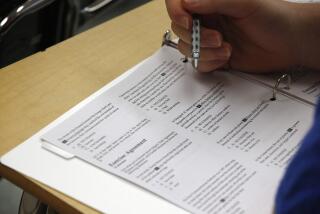Media Lab Hits the Superhighway
- Share via
Even in Southern California, where the streets are adorned with all manner of automotive vehicles, this converted 1977 Chevrolet motor home is exceptional.
It’s called the Multisensory Learning Lab, a colorful road warrior that will eventually make stops at all 106 of the state’s community college campuses. It contains 40 computers, plus printers, scanners, digital cameras and other high-tech equipment worth more than a half-million dollars.
On Friday, it pulled into a parking lot at Pasadena City College, marking the final stop on its maiden voyage. Since its first campus visit in late October at Los Angeles Harbor College, the mobile multimedia lab has visited nine community colleges in Los Angeles, Orange and San Bernardino counties, plus USC and a couple of high schools and technical trade shows.
The Lab is the brainchild of David Springett, president of the California Community Colleges Foundation in Sacramento.
“We wanted to give the faculty a better understanding of how to use technology in their classrooms,” said Springett, himself a technology veteran from Xerox. The foundation developed a technology training program, took it on a makeshift 20-campus tour and quickly established a waiting list of 50 more colleges.
“We needed a more effective way of doing this, so I said, ‘Let’s put this on wheels,’ ” Springett said.
Those wheels turned out to be a surplus RV that had been used by marine biologists at the Environmental Protection Agency. It had been filled with seawater and was thick with sludge. With a $100,000 grant from Edison International, the foundation towed the vehicle from Alameda to Sacramento, then gutted and rebuilt it. Today, the lab is outfitted with hardware and software donated by 25 corporate sponsors.
Six Apple Macintoshes and four Compaq Presarios line the gray carpeted walls inside the vehicle. A smattering of printers, scanners, disk drives, servers, network routers and video monitors are also spread about.
“When we pull in, we just plug into a local power source and boot up the computers,” said Kirsten Ryden, a program specialist with the California Community Colleges Foundation. “Then the faculty members come on board and orient themselves with what the technologies are, and they see demos of what other faculty members have created. We can also offload 30 laptop computers that are connected in a wireless network and teach in an actual classroom.”
More than 300 community college faculty members have climbed aboard to learn how to use Microsoft PowerPoint, MacroMedia SoundEdit 16, Adobe Premiere and other tools to create multimedia presentations, said Richard John Jenkins, a Los Angeles-based multimedia consultant who has been conducting training sessions in the Lab.
The Lab has helped a speech teacher conserve his voice by introducing him to a software program that can read aloud the lectures he has typed. A chemistry teacher used the Lab to create a virtual spectrophotometer so that his students could measure wavelengths of light in the absence of a $50,000 machine, Jenkins said.
But most of the Lab’s uses have been decidedly more basic, such as overcoming teachers’ fears “about breaking [a computer] or otherwise messing up,” Ryden said.
Only about 10 teachers can squeeze into the lab at a time, so the classes have an intimate and nonthreatening feel, said Laurie Burruss, a PCC professor who has been prodding the college into the multimedia age.
“Because of the small group, they’re a lot less inhibited,” she said. “They don’t mind saying: ‘I’m dumb about this even though I’m a college professor.’ ”
*
Karen Kaplan covers technology and telecommunications. She can be reached at karen.kaplan@latimes.com
More to Read
Sign up for Essential California
The most important California stories and recommendations in your inbox every morning.
You may occasionally receive promotional content from the Los Angeles Times.











